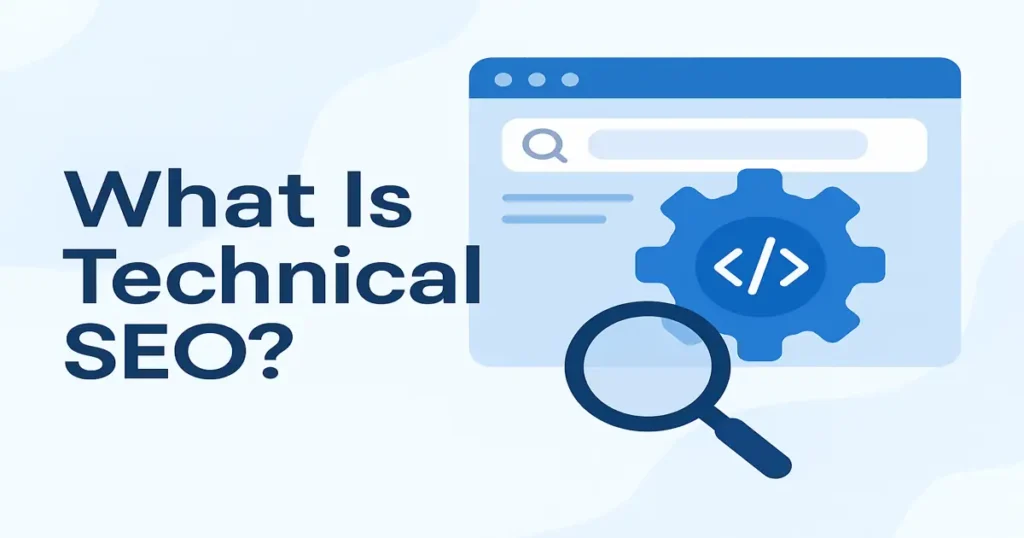Even if you have solid content and good backlinks, your website might still have trouble showing up on search engines. That usually means something behind the scenes is not working right. In 2025, technical SEO is not just an extra thing. It is a core part of every successful website. Without it, your entire SEO strategy can fall apart.
Whether you’re a blogger, marketer, SEO expert, or a business owner running your own site, this article will walk you through the 15 key benefits of technical SEO that can improve rankings, speed, visibility, and user experience. These are not just nice-to-haves. These are SEO success factors.
Why Understanding the Benefits of Technical SEO

Let’s be real. Most websites lose traffic not because of bad content, but because of poor technical setup. Broken links, slow loading times, confusing structure… all these silent killers work against you.
This guide is for:
- Bloggers who want their posts indexed faster
- Marketers chasing higher conversion rates
- Developers and SEOs fixing backend issues
- Site owners building long term visibility
Once you understand the importance of technical SEO, everything else in your strategy becomes more effective.
What Is Technical SEO?

Technical SEO means setting up your website in a way that makes it easier for search engines to find, read, and list your pages. It focuses on improving the parts of your site that work in the background, so everything runs smoothly for both users and search engines.
Unlike On Page SEO (which focuses on content) or Off Page SEO (which deals with backlinks), technical SEO is about how your site is built and how efficiently it communicates with search engines.
Sadly, many site owners overlook it. But without it, even the best content may never show up in Google.
15 Powerful Benefits of Technical SEO
Now let us take a closer look at why technical SEO matters so much in 2025 and how it can make a real difference for your website.
1. Higher Rankings with Clean Website Architecture
A well organized website structure improves website crawlability. When internal links are done right, search engines find your content faster and understand which pages are most important.
Want proof? Just look at your website crawlability issues in Google Search Console (GSC) and fix them.
2. Lightning Fast Load Speed = Lower Bounce Rate
Speed optimization matters more than ever. With Google’s Core Web Vitals now being a ranking signal, your site must load quickly. Use tools like PageSpeed Insights or Lighthouse to monitor load times.
3. Easier Indexing Means Faster Visibility
If you want your website to show up in search results more quickly, you need to make it easier for search engines to crawl and understand your pages.
Learn how to check your website indexability.
Elements like XML sitemaps, proper robots.txt optimization, and canonical tags help Google know what to crawl and index. Learn how to Add Sitemap to Robots.txt.
4. Improve Mobile SEO by Focusing on Mobile Users First
These days, most people browse the internet using their phones or other mobile devices. In fact, over 60 percent of people visit websites using their phones. If your site is not mobile friendly, you are already missing out.
You can start by checking your website using Google’s Mobile Friendly Test. If you want to take things further, try using helpful tools like WordPress plugins made to improve Core Web Vitals. These can help you boost your mobile SEO and give users a smoother experience on smaller screens.
5. Unlock Rich Snippets with Structured Data
Structured data SEO helps Google show enhanced results like reviews, FAQs, or recipes. This increases clicks and trust.
Use Google’s Rich Results Test and follow this Guide to Schema Markup.
6. Protect Your Rankings from Future Google Updates
Google core updates hit messy sites hard. Clean code, fast load times, and a logical layout protect you.
Start with this Technical SEO Checklist to stay ahead of algorithm shifts.
7. Strengthen Security with HTTPS
Making sure your website is secure helps build trust with your visitors and also makes it easier for search engines to trust your site. When your site uses HTTPS, it builds trust with visitors and can also help improve your rankings. Web browsers like Chrome may even show warnings if your site is not secure, which can turn people away. It is always better to protect your visitors and your search performance at the same time.
8. Improve UX with Better Core Web Vitals
Great user experience is not just for users. It helps SEO too.
Important performance metrics such as LCP, FID, and CLS have a direct impact on your search rankings. You can track how well your site is doing by checking the Core Web Vitals report inside Google Search Console. It helps you understand where improvements are needed for better user experience and SEO results.
9. Identify and Fix SEO Killing Issues
Problems like broken links, endless redirects, and crawl errors can quietly harm your website’s performance. They often go unnoticed but have a big impact on how search engines see your site. You can find and fix these issues using tools such as Screaming Frog and Google Search Console.
Need help? Start with an Advanced Technical SEO Audit.
10. Enhance Internal Linking Strategy
Internal links make it easier for search engines to find your pages and see how different parts of your website are related to each other. They also pass value from one page to another, which can improve indexing and overall visibility.
11. Scale SEO for Large Sites and Future Growth
Organizing your site with clear filters, well-structured XML settings, and proper page numbering is very important. These elements help search engines crawl large websites more efficiently and keep your content well organized.
If you manage thousands of URLs, our Pagination SEO Tips will help you avoid index bloat.
12. Better Tracking, Analytics, and Reports
Structured site setups lead to better insights from GA4, Ahrefs, GSC, and Semrush. You’ll know exactly what’s working.
13. Improve Monetization Opportunities
When your website is set up properly from a technical point of view, it loads quickly, handles tracking more accurately, and becomes easier for search engines to understand. This can lead to better visibility in search results, which also helps boost earnings from AdSense and affiliate links.
Good technical health means better revenue.
14. Boost Accessibility for Users & Bots
Using proper HTML tags, adding alt text to images, and including ARIA roles makes your website easier to use for everyone, including people with disabilities. These elements also help search engines better understand your content, which can improve how your pages are crawled and ranked.
Inclusive design is the future.
15. Lay a Strong Foundation for All Other SEO
You can think of technical SEO as the foundation that supports your entire website. If that base is weak or poorly built, your content and backlinks may not deliver the results you expect. A strong setup behind the scenes helps everything else work better.
This is your SEO foundation. Build it right.
Tools That Help You Reap These Benefits

These helpful tools can guide you as you improve your website’s technical SEO:
- Google Search Console: Monitor crawl and index issues
- Screaming Frog: Find broken links, redirects
- Sitebulb: In depth technical audits
- Ahrefs / Semrush: SEO diagnostics and performance tracking
- Google’s PageSpeed Insights: Measure and improve page load
Final Thoughts
Technical SEO is not a one-time job. It needs ongoing attention, just like your website does. Think of it as the engine that keeps everything running in the background. If your rankings are not moving up or your traffic is not growing, the problem might not be your content. It could be something in how your site is built or how search engines interact with it.
Key Takeaways:
- Focus on page load speed and SEO improvements
- Make your site mobile friendly
- Ensure Googlebot access with clean architecture
- Secure your domain with HTTPS
- Use structured data and sitemaps
Build your SEO strategy on solid ground.
FAQs
Why is technical SEO important in 2025?
Because search engines are getting smarter. In 2025, technical SEO plays a big role in helping your site get discovered, understood, and ranked. If your site is not fast, secure, mobile-friendly, and easy to crawl, search engines might ignore even your best content.
Can I do technical SEO on my own without a developer?
Yes, you can handle many parts of technical SEO yourself, especially with tools like Google Search Console, Screaming Frog, or Sitebulb. But for deeper fixes like server errors or code issues, you may need a developer’s help to do it right.
How do I know if my website has technical SEO issues?
Look for signs like slow page speed, pages not getting indexed, or crawl errors in Search Console. You can also use tools to run a site audit and check for broken links, missing tags, or problems with your sitemap or robots.txt file.
How long does it take for technical SEO changes to show results?
Some changes like fixing broken links or adding a sitemap can improve your site’s indexing in a few days. Others, like improving site speed or Core Web Vitals, may take a few weeks to impact your rankings. But every fix moves you in the right direction.
Does technical SEO help with user experience too?
Absolutely. A fast, mobile-friendly, and well-structured site is not just good for Google. It is great for your visitors too. Better UX means people stay longer, bounce less, and trust your site more, which all supports stronger SEO.







